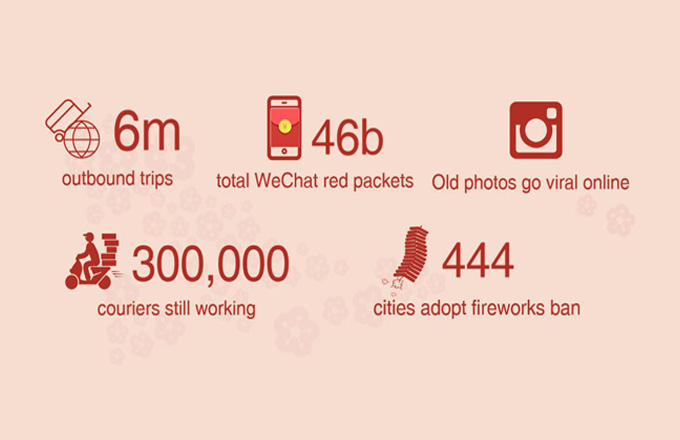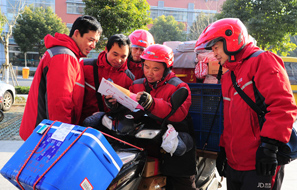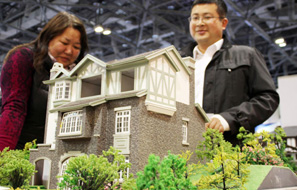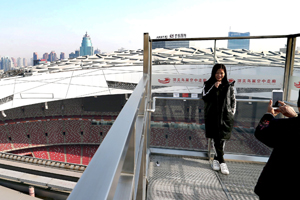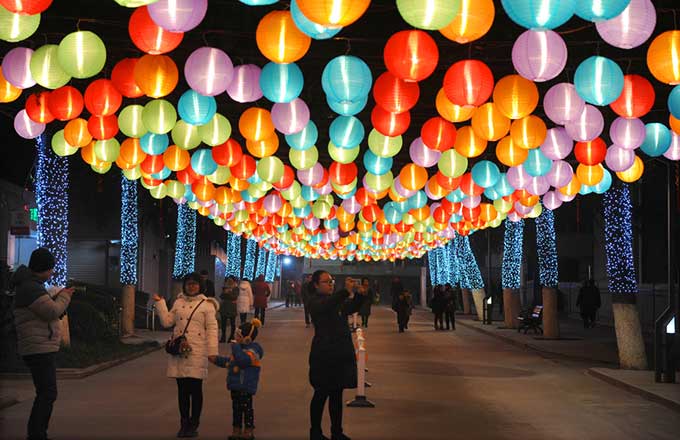Education policies to lessen pressure
Measures won't reduce competition for good schools, parents believe
Gao Ge does not like to see her 8-year-old daughter idle.
"If children do nothing but fool around when they're young, what will they do when they get older?" the Beijing mother said.
So instead of relaxing, her daughter participates in a range of after-school classes, including English and learning the guzheng, a traditional Chinese instrument.
"I just want to open doors for her," Gao said, adding that competition for places at good schools is too fierce for children to waste time playing.
It is a belief shared by many Chinese parents, particularly in the capital, and one that could limit the effect of policies to reduce pressure on students.
On March 19, Beijing abolished midterm exams for primary school students, and the Ministry of Education launched a national campaign this month to reduce homework for students of all ages.
A 2011 report by Shanghai's Xuhui district found that more than 60 percent of students spend two to four hours a day on homework, mostly math assignments.
Based on a survey of 20,945 students at 39 schools, the district also found that the average middle school student regularly got only seven hours of sleep a night, two short of the Education Ministry's recommendation.
In Beijing, the education commission has set a daily time limit on how much daily homework students should do - one and a half hours.
Schools have begun to reduce the number of exams that students take and are strictly controlling after-class assignments.
Wu Zhengxian, a deputy of the National People's Congress and a researcher in elementary education at the Beijing Academy of Educational Sciences, also confirmed on Tuesday that textbooks for primary and middle schools will be revised in September to remove material too advanced for their grade levels.
Content should follow a national standard to avoid heaping pressure on students, she said. "Anything too difficult for the (average) student to comprehend should be replaced."
However, some argue the policies do not tackle the root causes of student stress: Parents and the national testing system.
Wen Hong, who teaches math at a Beijing high school, said that as long as youngsters need to take the high school and college entrance exams, the zhongkao and gaokao, the majority of parents will continue to pile on the pressure.
"Parents will still have their children participate in extra classes, and schools will continue to provide more exercises because schools have concerns the reduction of exercises will affect students' scores," he said.
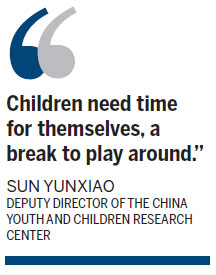 If every school can provide a relaxed study environment, the burden for students will be less, Wen said, but this will require a lot of effort from parents as well as schools to make the change.
If every school can provide a relaxed study environment, the burden for students will be less, Wen said, but this will require a lot of effort from parents as well as schools to make the change.
Sun Yunxiao, deputy director of the China Youth and Children Research Center, encouraged parents to change their attitudes and respect their children's need for leisure time.
"Children need time for themselves, a break to play around," he said.
He agreed that a change to the gaokao and zhongkao systems would help relieve students' stress. "The evaluation system values sports and social involvement more than before, which will slightly alter parents' beliefs and guide them to focus less on exam scores," he added.
Despite her determination to ensure her daughter has an active childhood, Gao said that in the end, nothing should be more important to parents than their child's happiness.
"My daughter's guzheng teacher and I agree that it's best to encourage her interests rather that push her for awards," she said. "I hope it can become a lifelong hobby, not a temporary tool to get her into a better middle school."
Contact the writers at [email protected] and [email protected]






